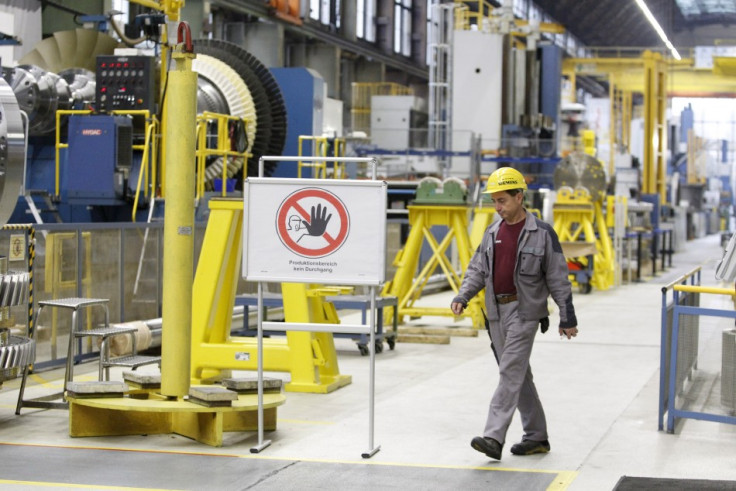German Economy 'No Longer Running Smoothly' Amid Flat Eurozone Growth and Russia Sanctions War

German business sentiment is sombre as the eurozone economy stagnates and a sanctions battle between Russia and the West begins to hurt the country's firms.
The Ifo Business Climate Index for industry and trade in Germany fell in September to 104.7 points, its lowest level since April 2013.
"The German economy is no longer running smoothly," said Hans-Werner Sinn, president of the Ifo Institute.
As the largest economy in the eurozone, Germany powers much of the growth in Europe, so any downturn threatens to ripple out to the currency bloc's 17 other member states.
Germany does a significant amount of trade with Russia and so stands to be among the worst affected by the tit-for-tat sanctions war over the latter's military interference in troubled Ukraine.
The European Union (EU) has imposed capital and trade sanctions on Russia, targeting some of the country's wealthiest individuals with close ties to Russian President Vladimir Putin.
In return, Russia has brought in its own sanctions, such as banning many food imports from the West. It also provides much of Europe's gas supply, though it has not yet turned off the taps.
The threat of any escalation in tensions between Europe and Russia is worrying investors and putting some businesses off making investment decisions.
On top of geopolitical issues, the eurozone economy is struggling through public sector austerity programmes and financial sector reforms that have seen bank lending to businesses and consumers slashed.
Unemployment is high in many parts of the eurozone and inflation is hovering just above zero. Economic growth in the second quarter was flat.
To boost bank lending and growth, the European Central Bank (ECB) has slashed its interest rates and is pumping hundreds of billions of euros in stimulus into the financial sector.
Yet output growth across the eurozone sunk to a nine month low in September. Researcher Markit said in a flash estimate that its monthly output index for the eurozone came in at 52.3, a slowdown from August's 52.5 and the lowest since January. Any reading over the neutral 50 mark represents growth in economic activity.
"The survey paints a picture of ongoing malaise in the eurozone economy," said Chris Williamson, chief economist at Markit, whose index is compiled from surveys of purchasing managers across the three main sectors: service, manufacturing, and construction.
"With growth of output and demand slowing, employment once again failed to show any meaningful increase. Such torpor meant prices continued to fall as firms fought for customers, which will inevitably heighten concerns that the region is facing deflation."
Williamson said Markit's surveys imply eurozone economic growth of just 0.3% "at best" in the third quarter of 2014 "buoyed by a 0.4% expansion in Germany but dragged down by stagnation in France and sluggish growth in the rest of the region".
"There are also worrying signs that growth could slow further in the fourth quarter," he said.
"Inflows of new orders in the manufacturing sector are declining again, dropping for the first time in 15 months, and business expectations about the year ahead turned down in the services sector, led down by a slump in confidence in Germany.
"Concerns about the Ukraine crisis, related Russian sanctions and worries about the single currency area's general economic plight appear to be having an increased impact on the eurozone economy. The danger is that the ECB's efforts to stimulate the economy will prove ineffective in the face of such headwinds, which are exacerbating already-weak demand."
© Copyright IBTimes 2025. All rights reserved.






















